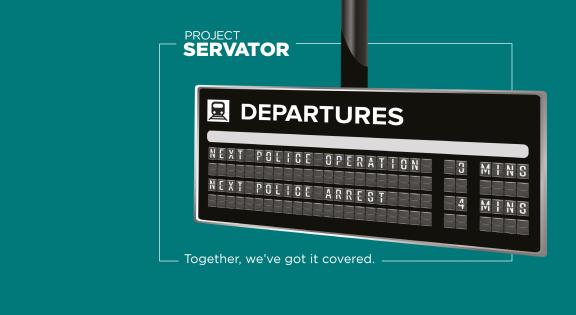Project Servator police deployments were originally introduced by City of London Police in February 2014. The policing tactic has since been adopted by many police forces, including at a number of airports and across the transport network, and has been used at major events, including the Commonwealth Games, Wimbledon Tennis Championships, music festivals and at the Christmas markets.
Project Servator aims to disrupt a range of criminal activity, including terrorism, while providing a reassuring presence for the public. Our officers are experienced and specially trained to spot the tell-tale signs that someone is gathering information to help them plan or prepare to commit a crime.
We believe that 'Together, we've got it covered', so we are working with partners, including other police forces, security staff and CCTV operators, local businesses and retailers and members of the public, to continue to keep people safe in Northern Ireland and protect everyone who lives, works or visits here and make it a difficult place for criminals and terrorists to operate.
What you can expect to see
Project Servator patrols are highly visible and can happen at any time and in any location. They are characterised by the use of a range of policing assets - dogs, vehicles, plain clothes - in an unpredictable way. If you see Project Servator officers in your area, there's nothing to worry about. They are normal police deployments designed to disrupt criminal activity and are not in response to any specific threat.
They are made up of a range of resources, including:
- Uniformed officers - Officers will talk to the public, local businesses and private security staff to let them know what they're doing and remind them to be vigilant, trust their instincts and report any suspicious or unusual behaviour. You may also see posters on display boards and officers handing out leaflets explaining more about Project Servator. Working with the community is a vital part of making this a success so please feel free to come and talk to our uniformed officers about Project Servator or anything that is of concern. They will be happy to answer any of your questions about what they are doing and why.
- Plain clothed officers - These officers won't be easily spotted as they are there to help their uniformed colleagues and keep an eye out for people seeking to avoid police! We can't be everywhere but we could be anywhere!
- Police Dogs - Our four legged friends are very friendly. They're also highly trained and fearless when it comes to confronting threats. They can sniff out hidden drugs, firearms and explosive materials and work hard searching for anything that could put others in danger.
- CCTV - This is monitored and used to help detect those who are intent on committing crime.
- Searches - The Police Service of Northern Ireland has a positive obligation to prevent and detect crime in order to protect our communities from harm and build a safe, confident and peaceful society. Stop and search is an operational tool used to prevent, detect and investigate crime as well as to bring offenders to justice and officers have a range or powers they can use to stop and search individuals and vehicles. Read more information about stop and search.
- Other checks - We can also use other security measures that may not be visible.
Project Servator on social media
Our officers also engage with the online community, sharing information about Project Servator and its successes. Follow #ProjectServator on our corporate X account @PoliceServiceNI or follow our Police Service of Northern Ireland Facebook account for updates.
What you need to do
Members of the public have an important role to play in helping keep people safe and to make Project Servator a success by reporting anything that doesn't feel right. We rely on you to be our eyes and ears so please report your concerns - this could be an unattended item or someone acting suspiciously.
Tell one of us or a member of staff or call the non-emergency number 101. In an emergency always call 999.
Trust your instincts and report it to police.

